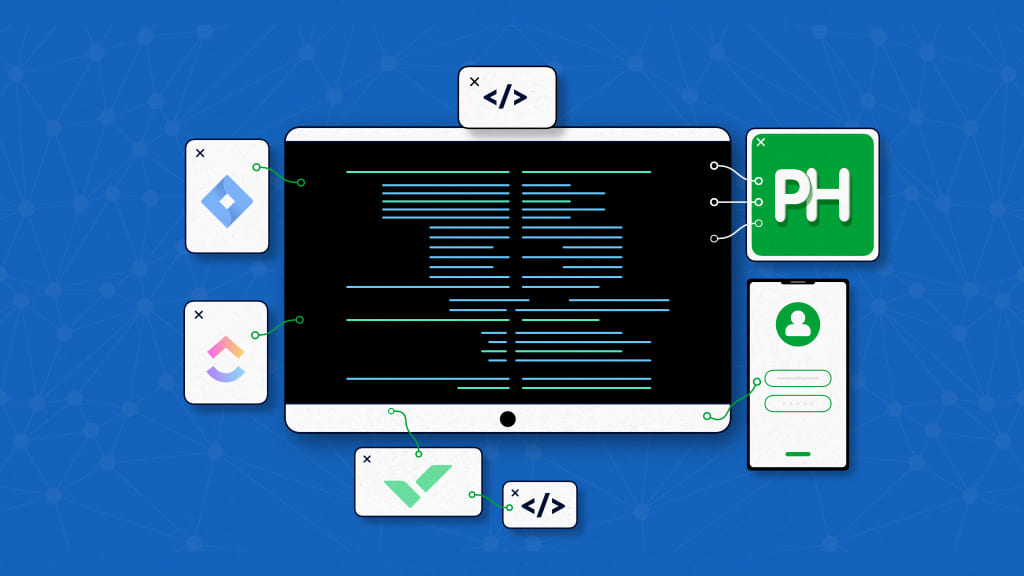Looking for software development project management tools?
A software development team uses a minimum of 8 to 10 different categories of tools to develop software. Each category of tool has its importance. The role of a software project management tool is to ensure a software development team can deliver a project on time, within budget, and with no errors.
77% of high-performing teams use project management software. Project management software helps you manage tasks and collaborate with resources to work together efficiently.
In this post, we look at the best software development project management tools for software developers. This will help you choose the right tools as per your needs.
Top 11 software development project management tools
There are many software development project management tools in the market. Each offering something unique. Some are great in ease of use, some are designed for higher levels of security, and some are for experienced Agile teams.
We have compared the features, pros and cons, and pricing of the top 11 software development project management tools. Have a look at them.
1. ProofHub – Best for task organization and ease of use
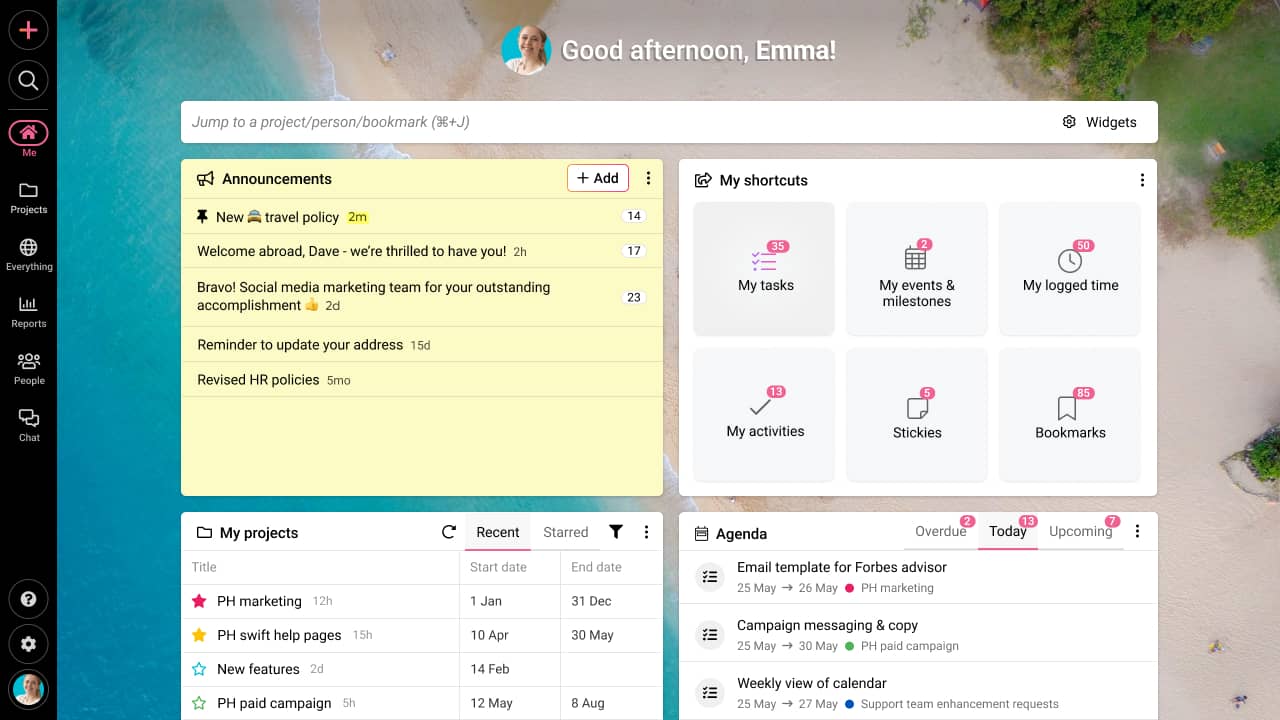
ProofHub is a feature-rich project management and team collaboration tool for software developers. It is an easy-to-use tool that brings all your projects and team communication into one centralized Workspace. This makes it easy to work together, improves work efficiency, and results in fewer conflicts.
ProofHub supports Agile methodologies, sprint planning, and issue tracking for efficient Agile software development.
One of the key strengths of ProofHub is its ability to organize tasks in a hierarchical structure. You can create a project, under a project you can create multiple task lists, and under each task list, you can add thousands of tasks. This provides a high degree of organization and makes it easy to sort the entire work, resulting in higher productivity.
Apart from that, the built-in collaboration features of ProofHub ensure your team is on the same page and working together efficiently.
Key features
- Create tasks, add information required to complete a task, and assign tasks to the team members from a single centralized place.
- Track the progress of a task using various filters in the Table view.
- Visualize and manage sprints on Kanban boards with customized workflow. Create a product backlog, add stories, prioritize stories, and move items to the sprint backlog.
- Visualize the workload of each resource in a Calendar view.
- Create product roadmaps, set milestones, add goals, set task dependency, and add constraints using the Gantt tool.
- Project reports, resource reports, and time reports for visual insights into project status
- Track the time spent on tasks with automatic time tracking and create timesheets for efficient time management.
- Communicate with team members in real-time with built-in chat. Tag team members using @mention task comments for task updates. Use project discussion for engagement with clients and project documentation.
- Attach files directly to the tasks for efficient collaboration and easy organization.
- Send invoices to clients using third-party integration with Quickbooks and Freshbooks.
Pros
- Intuitive and user-friendly interface. Easy to use. Minimal learning curve.
- All-in-one solution, helping you replace multiple apps with one.
- Flat-pricing structure that allows unlimited users to use the tool.
- Custom roles to manage access of various stakeholders.
- Forms to collect client requests or bug details. Issue tracking with the task ID.
Cons
- Not suitable for freelancers/single users.
Pricing
You get a 14-day free trial to try all the premium features of ProofHub!
ProofHub offers two plans: Essential and Ultimate Control.
- Essential: $45/month for unlimited users and up to 40 projects when billed annually.
- Ultimate Control: $89/month for unlimited users, unlimited projects, and all the premium features when billed annually.
User ratings
- Capetera: 4.6 out of 5 stars
- G2: 4.6 out of 5 stars
Website link: www.proofhub.com
2. Jira – Best for agile project management

Jira is a dedicated software development project management software. It is designed specifically for Agile software development teams. It is known for its design to directly support Agile project management for software development. You can plan, code, deploy, release, and maintain the software from one place. The only thing is you need expertise in Agile methodologies to make use of this tool.
Key features
- Create product roadmaps, set milestones, and map work items on interactive timelines.
- Scrum boards and Kanban boards to implement agile project management.
- Report and insights to track progress and measure project performance. Comprehensive issue tracking with Jira issues.
- Templates to effectively implement Agile frameworks such as Scrum, Kanban, and DevOps.
Pros
- Bug-free tool with 99.9% uptime and 24/7 support.
- Integrate with more than 3000+ apps used by software developers and comes with out-of-box integration with Jira products.
- Simple drag-and-drop Jira automation to save time.
Cons
- Steep learning curve. Needs in-depth knowledge of Agile project management to set up and configure.
- Lack of customization in reporting.
Pricing
Jira offers four plans:
- Free plan: Limited storage and up to 10 users.
- Standard: $7.16 per user per month.
- Premium: $12.48 per user per month.
- Enterprise: Custom pricing.
User ratings
- Capterra: 4.5 out of 5 stars
- G2: 4.3 out of 5 stars
Website link: www.atlassian.com/software/jira
Read more: Trello vs Jira vs ProofHub – Which Tool is Best of Them All?
3. Workstatus
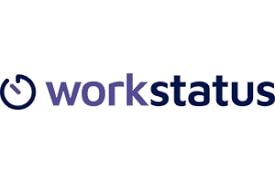
Workstatus is an all-in-one project management software designed to boost productivity and visibility across teams of any size. From project planning and employee monitoring to automated time tracking and workforce analytics, Workstatus gives managers complete control over projects and resources.
It’s particularly effective for businesses looking to combine project execution with performance tracking and productivity management in one platform.
Key features
- Project and task management with budgets, milestones, and timelines.
- AI-powered productivity analytics and workforce insights.
- Automatic time tracking with activity levels and app/website monitoring.
- GPS tracking and geofenced job sites for remote and field teams.
- Detailed reports and real-time dashboards for better decision-making.
- Shift scheduling and leave management.
Pros
- Combines project management and employee monitoring in a single tool.
- Real-time workforce analytics to prevent burnout and optimize workloads.
- Easy-to-use interface with minimal learning curve.
- Affordable compared to other enterprise-grade solutions.
Cons
- Some advanced features (like geofencing) may not be needed by small teams.
- Limited third-party integrations compared to older players in the market.
Pricing
Workstatus pricing plan starts at just $1.6 per user, with flexible custom plans available to fit businesses of all sizes.
User Ratings
- G2 – 4.6 out of 5 stars
- GoodFirms – 4.5 out of 5 stars
Website – https://www.workstatus.io/
4. Wrike – Best for streamlining workflows

Wrike is an enterprise-grade work management platform that provides all the tools you need to work together in a team in one place. It provides you with features for project planning, resource planning, workload management, team collaboration, workflow automation, time tracking, project reporting, and more. It focuses on driving work efficiency by streamlining all of your workflows in one platform, automation, and advanced reporting and analytics.
Key features
- Create a customizable workflow for Agile project management.
- Real-time project reports, advanced analytics, and business intelligence.
- Cross-tagging, file sharing, and live document editor for team collaboration.
- Resource allocation and planning, workload management, and workload charts.
Pros
- Enterprise-grade security. Provide double encryption, use authentication, and more.
- Wrike intelligence to prevent project risks and workflow automation to improve efficiency.
- Onboarding training and exceptional customer support.
Cons
- Steep learning curve. Take time to set up.
- Expensive than other project management tools. Limited features in the free plan.
- Lack of native integration with Agile software development apps.
Pricing
Wrike offers four plans:
- Free plan
- Team plan at $9.80/user/month (billed annually)
- Business plan at $24.80/user/month (billed annually)
- Enterprise plan at custom pricing for large teams (billed annually)
- Pinnacle plan at custom pricing for teams with complex needs
User ratings
- Capetera: 4.4 out of 5 stars
- G2: 4.2 out of 5 stars
Website link: www.wrike.com
Check out thedetailed comparison between Wrike and ProofHub
5. ClickUp – Best for customization

ClickUp is a simple project management software known for its simplicity and customization. It focuses on improving productivity by bringing all the tools you need to work in one place. You can plan projects, create tasks, track progress, manage projects, and collaborate with a team all from a single platform.
Key features
- More than 15 project views to track the progress from every angle.
- Customization capabilities allow you to decide the features you want.
- Powerful collaboration capabilities including whiteboard, comments, chat, and Clickup docs.
- Time tracking and reporting. Get intuitive and customizable real-time reports.
Pros
- Comes with a user-friendly and intuitive interface.
- Customizable and flexible platforms. Ideal to meet your specific needs.
- Comes with plenty of out-of-the-box features.
Cons
- Inconsistent tool with too many bugs.
- Poor customer support that does not resolve issues.
- A high number of features makes it complex to use for beginners.
Pricing
ClickUp offers four plans:
- Free forever: Best for personal use
- Unlimited: $7 per user per month
- Business: $12 per user per month
- Enterprise: Custom pricing
User ratings
- Capterra: 4.7 out of 5 stars
- G2: 4.7 out of 5 stars
Website link: https://clickup.com
6. Trello – Best for Kanban-based work management
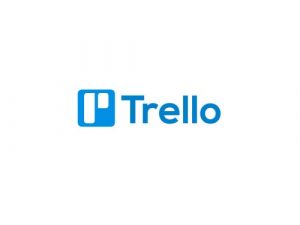
Trello is a lightweight project management tool designed by Atlassian for work management. It does not come with loads of out-of-the-box features but it has powerful Kanban boards, workflows, and automation to make work management easy for you. You can plan sprints, create a project roadmap, and visualize the tasks on the Kanban boards.
Key features
- Simple, flexible, and powerful Kanban boards to manage tasks.
- Built-in project templates to get you started quickly and easily.
- Timeline and calendar views to track project progress.
- Integrate with a large number of third-party apps to provide a complete solution.
Pros
- Easy to use with a user-friendly interface and easy to set up with minimal learning curve.
- Butler automation to automate routine tasks.
- Trello cards capture a lot of information required to complete a task.
Cons
- Relies on integration even for basic project and work management.
- Limited project views make it difficult to track the progress of multiple projects together.
- Lack of advanced collaboration capabilities.
Pricing
Trello offers four plans:
- Free forever
- Standard: $5 per user per month
- Premium: $10 per user per month
- Enterprise: $17.50 per user per month
User ratings
- Capterra: 4.6 out of 5 stars
- G2: 4.4 out of 5 stars
Website link: https://trello.com
7. Asana – Best for no-code workflow automation

Asana is task management software that focuses on improving work efficiency with automation. It helps you reach project objectives with extensive goal setting and tracking. It provides you with a wide range of features for project planning, resource management, team collaboration, workflow automation, goal setting, and reporting.
Key features
- Create a custom workflow and build rules to automate workflow.
- Send automatic reminders for risk management.
- Set goals, connect to the sprints, and track the progress with reports.
- Visualize team workload, manage resources, and track time.
Pros
- Seamlessly integrate with more than 300 daily use apps.
- Built-in templates to create project plans.
- No code, error-free, and useful automation.
Cons
- Comes with a learning curve.
- Expensive compared to the other tools in the same category.
- Collaborating with teams requires effort.
Pricing
Asana offers three plans:
- Free: Best for individuals
- Starter: $10.99 per user per month
- Advanced: $24.99 per user per month
- Enterprise: Custom pricing
- Enterprise+: Custom pricing
User ratings
- Capterra: 4.5 out of 5 stars
- G2: 4.3 out of 5 stars
Website link: https://asana.com
8. Zoho Projects – Best for end-to-end work management
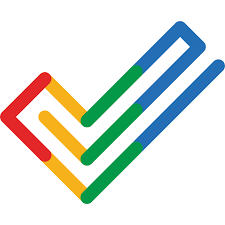
Zoho Project is another great project management software for software developers. It provides you with all the features you need to manage and track your software projects. You can create a project plan, allocate tasks, track issues, automate workflows, log billable and non-billable hours, create reports, and collaborate with a team from one platform. It comes with built-in CRM, issue tracking & SLA, and invoicing to provide you with an end-to-end work management solution.
Key features
- Create custom workflows, manage sprints with Kanban boards, and automate workflows.
- Record issues or bugs in your project for effective issue management and bug tracking.
- Track time manually or with timers, and automatically generate invoices with Zoho Invoice.
- Third-party integration with developer tools like Jira, GitHub, and Dropbox.
Pros
- Design and architecture make it easy to use.
- Enterprise-grade security.
- Cheap project management platform.
Cons
- Poor customer support.
- Integrations with other tools are clunky.
- Missing some standard features such as table view, column sorting, and advanced filters.
Pricing
Zoho Projects offers three plans:
- Free plan: Up to three users
- Premium plan: $4/user/month
- Enterprise plan: $9/user/month
User ratings
- Capterra: 4.4 out of 5 stars
- G2: 4.3 out of 5 stars
Website link: www.zoho.com/projects
9. Smartsheet – Best for spreadsheet-based project management

Smartsheet is an enterprise-grade project management software that can help you handle multiple large software development projects with ease. It provides you with advanced project management capabilities such as project planning, project budgeting, project reporting, resource management, portfolio management, digital asset management, team collaboration, and workflow automation.
Key features
- Built-in Agile template to set up software development projects.
- Track and visualize work in multiple views including Grid, Board, Gantt, and Calendar.
- Powerful reporting capabilities. Get access to key metrics and project information using real-time dashboards.
- Workflow automation to automate repetitive tasks.
Pros
- Highly customizable to fit any workflow.
- Enterprise-level security.
- The consistent tool with reliable features and the ability to scale.
Cons
- Steep learning curve.
- Complex interface.
- Expensive business and enterprise plan.
Pricing
Smartsheet offers four plans:
- Free forever for personal use
- Pro: $7 per user per month
- Business: $25 per user per month
- Enterprise: Custom pricing
User ratings
- Capterra: 4.5 out of 5 stars
- G2: 4.4 out of 5 stars
Website link: www.smartsheet.com
10. Redmine – Best free project management app

Redmine is a free, web-based, and open-source project management tool for software development. It is used by thousands of software development teams worldwide. It allows you to create project plans, plan sprints, track issues, and collaborate with the team effectively. To make life easy for developers, Redmine provides you access to the community of developers for discussion and new ideas.
Key features
- Gantt charts and calendar for project scheduling.
- Provides per-project wikis and forums for knowledge management.
- Integrate with top developer tools and version control systems.
- Role-based access control and flexible issue-tracking system.
Pros
- Free and open source app with comparable features to its counterparts.
- Multi-language support and multiple database support.
- Natively supports LDAP authentication.
Cons
- User interface is outdated.
- Features are not as advanced as other platforms.
- Does not scale well with teams.
Pricing
Redmine is a free web application.
User ratings
- Capterra: 4.1 out of 5 stars
- G2: 4.0 out of 5 stars
Website link: www.redmine.org
11. Microsoft Project – Best for project planning
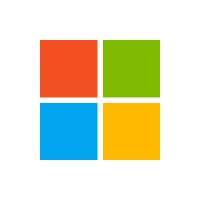
Microsoft Project is project management software that helps you create project plans and stay on track for your software development projects. You can track the progress of projects and resources across portfolios from one place. It integrates with Azure DevOps to help you deliver software products within budget and time of high quality.
Key features
- Plan your projects with the power of dynamic scheduling.
- Interactive dashboards for easy visualization of data.
- Advanced analytics with Power BI for project analytics and reporting.
- Project portfolio management to effectively plan, prioritize, and manage project and portfolio investments.
Pros
- Native integration with Microsoft suite of apps.
- Learning resources, onboarding training, and exceptional support.
- Enterprise-grade security.
Cons
- More expensive than others.
- Lack of advanced collaboration features.
Pricing
Microsoft Project offers two types of plans: Cloud-based solutions and On-premises solutions.
Cloud-based solutions:
- Project Plan 1: $10 per user per month
- Project Plan 3: $30 per user per month
- Project Plan 5: $55 per user per month
On-premises solutions:
- Project Standard: $679.99
- Project Professional: $1129.99
- Project server: Custom pricing
User ratings
- Capterra: 4.4 out of 5 stars
- G2: 4.0 out of 5 stars
Website link: www.microsoft.com/en-us/microsoft-365/project/project-management-software
What features to look for in a software development project management tool?
How a project management software functions directly impacts the team’s performance and how you plan & manage software projects. Therefore, you must choose the right software development project management tool.
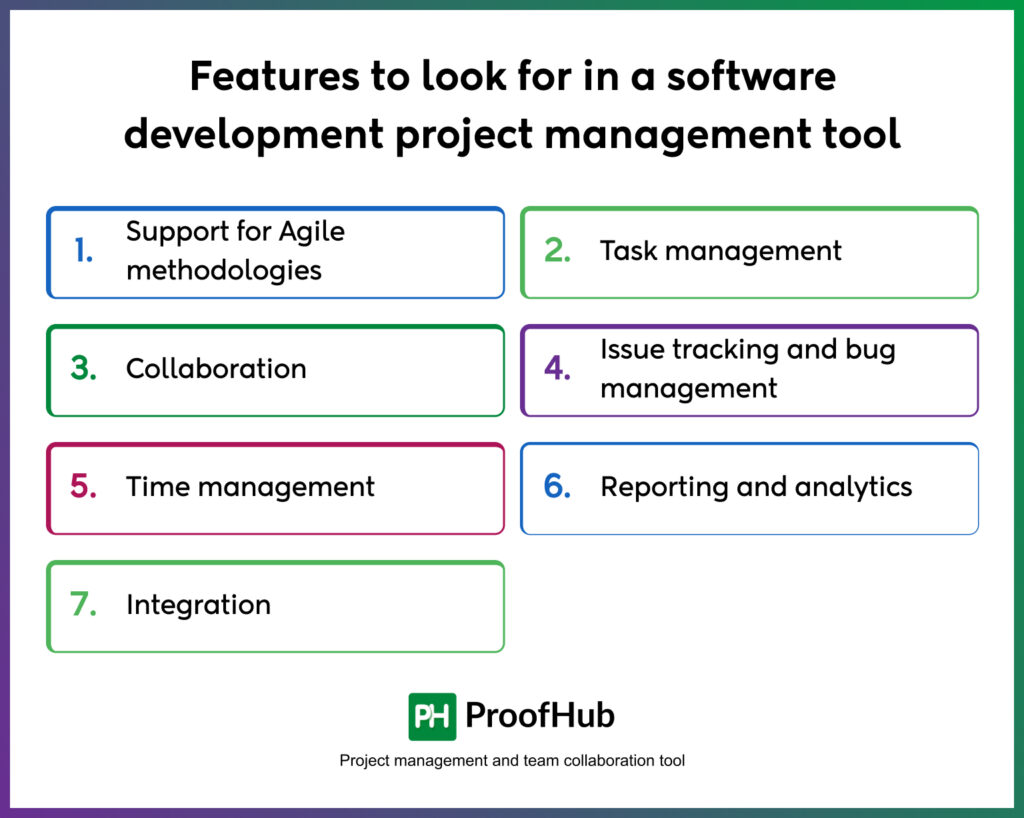
Here are the top features you should consider:
- Support for Agile methodologies: Project management software should support Agile frameworks such as Scrum, Kanban, and DevOps to help you implement Agile project management. You should be able to create product roadmaps, plan sprints, create custom workflows, visualize work in the Kanban board, and prioritize tasks.
- Task management: Project management software should allow you to create, manage, delegate, and track tasks from a centralized place. Each tool captures task information differently. Take into account what details you can add to tasks.
- Collaboration: The effectiveness of an agile team relies heavily on collaboration. A tool should provide you with advanced collaboration capabilities such as task comments, chat, project discussion, and file sharing to collaborate effectively.
- Issue tracking and bug management: Resolving bugs is part of a developer’s life. A project management software should be able to track bugs. It helps you resolve bugs effectively.
- Time management: Project management involves managing projects and resources. You should be able to track the time spent on tasks and create timesheets to effectively utilize your resources.
- Reporting and analytics: Agile software development focuses on continuous improvement. The tool should provide you with advanced project reporting capabilities to help gain insights from recorded data and improve performance.
- Integration: A software development team uses a variety of tools. The tool should support the third-party apps used by software developers. It makes work management easy for software developer teams.
How to choose a good project management tool for a software development team?
Choosing the right project management tools for a software development team depends on the type of project your team has taken over. You need the right tools and something easy for the whole team. Make sure it can handle the complexities of software development projects. Here are some of the key factors that you should consider while choosing a good software project management tools.
- Features: Opt for tailored project management tools for various project sizes and complexities, supporting hybrid methodologies with customizable workflows. It should foster seamless communication and collaboration with chat, task comments, and discussions. Additionally, it includes robust project planning and scheduling features, such as Gantt charts and effective planning tools, alongside comprehensive reporting functionalities for informed decision-making.
- Ease of Use: Usability is a crucial factor to consider. Your team should be able to jump right in and start using it without needing a Ph.D. in project management. The interface should be intuitive, allowing everyone to easily find their tasks and relevant documents.
- Cost: Factor in all the expenses, not just the base price. There might be extra fees for certain features or training. Prefer tools that allow you to make necessary changes to your project without breaking the bank.
- Support: Having reliable customer support is crucial. Consider factors like response time, available support channels, and their knowledge base.
With these considerations in mind, you’re on your way to selecting the perfect project management tool to empower your software development team!
Conclusion
The traits of a good software company are it consistently delivers software projects of the agreed quality on time and within budget. However. the success does not solely depend on the technical skills of the development team alone. You need to plan projects right, communicate effectively, and execute the plan strictly.
Project management software like ProofHub provides you with the platform to create & execute the project plan, collaborate with a team, and manage challenges you face in software development projects.
FAQs
What is the role of project management tools in software development?
A project management tool helps you plan a project, assign tasks, track progress, communicate with team members, create reports, and manage resources to work together in a team effectively. The purpose of using a project management tool is to complete the project within budget and time of the agreed quality with ease.
How can I ensure the successful implementation of project management tools in my development team?
You have to make your team realize the value of using a project management tool. Once they understand that it makes their life easy and improves productivity, you should invest in onboarding and training of the team to use the project management tool.
Are project management tools secure for handling development data?
Yes, most of the well-known project management software adheres to the industry security standards. However, if you have specific security requirements, you should contact the software provider for more information.
What are some good free project management tools for software development teams?
Top free project management tools for software development teams include Jira, Wrike, Zoho Projects, ClickUp, and Asana. But the problem is free plans are often bare-boned and offer limited features that are of little use.
What project management tools work well for managing remote teams of software developers?
Almost all the best project management tools for software development teams provide you with collaboration capabilities to manage remote teams of software developers. However, there are some specific features you should look for in a tool to effectively manage a remote team such as time tracking, real-time notifications, whiteboarding, and real-time audio and video conferencing.
